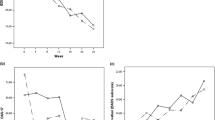Abstract
The immediate effects on depression of exploring versus modifying depressive thoughts were compared in chronic moderately to severely depressed patients receiving cognitive behavioral therapy (CBT). Using a withinsubject design, it was found that periods of “cognitive” CBT consistently produced more change in belief in identified depressive thoughts than did similar periods devoted to exploring and obtaining more information relevant to the thoughts. The greater change in belief resulting from “cognitive” CBT was consistently accompanied by greater reduction in self-rated depressed mood than was obtained in the Thought Exploration condition. Differences in the effects of the two conditions on a measure of speech rate were not consistent. The results support a central prediction of the cognitive model of depression and suggest the specific therapeutic effectiveness of “cognitive” CBT techniques.
Similar content being viewed by others
References
Beck, A. T., & Rush, A. J. Cognitive approaches to depression and suicide. In G. Serban (Ed.),Cognitive defects in the development of mental illness. New York: Brunner/Mazel, 1978.
Beck, A. T., Rush, A. J., Shaw, B. F., & Emery, G.Cognitive therapy of depression. Chichester and New York: Wiley, 1979.
Fennell, M. J. V., & Teasdale, J. D.Cognitive therapy with chronic drug-refractory depressed out-patients: A note of caution. Cognitive Therapy and Research, 1982,
Rush, A. J., Beck, A. T., Kovacs, M., & Hollon, S. Comparative efficacy of cognitive therapy and pharmacotherapy in the treatment of depressed outpatients.Cognitive Therapy and Research 1977,1 17–37.
Spitzer, R. L., Endicott, J., & Robins, E.Research diagnostic criteria (RDC) for a select group of functional disorders. (3rd ed.). New York State Psychiatric Institute, February 1978.
Teasdale, J. D., & Bancroft, J. Manipulation of thought content as a determinant of mood and corrugator electromyographic activity in depressed patients.Journal of Abnormal Psychology 1977,86 235–241.
Teasdale, J. D., Fogarty, S. J., & Williams, J. M. G. Speech rate as a measure of shortterm variation in depression.British Journal of Social and Clinical Psychology 1980,19 271–278.
Teasdale, J. D., & Rezin, V. The effects of reducing frequency of negative thoughts on the mood of depressed patients: Tests of a cognitive model of depression.British Journal of Social and Clinical Psychology 1978,17 65–74. (a)
Teasdale, J. D., & Rezin, V. Effect of thought-stopping on thoughts, mood and corrugator EMG in depressed patients.Behaviour Research and Therapy 1978,16 97–102. (b)
Author information
Authors and Affiliations
Additional information
This research was supported by the Medical Research Council of the United Kingdom. We are grateful to Peter Amies and Gillian Butler, who rated the recordings of the treatment interventions.
Rights and permissions
About this article
Cite this article
Teasdale, J.D., Fennell, M.J.V. Immediate effects on depression of cognitive therapy interventions. Cogn Ther Res 6, 343–351 (1982). https://doi.org/10.1007/BF01173582
Issue Date:
DOI: https://doi.org/10.1007/BF01173582




